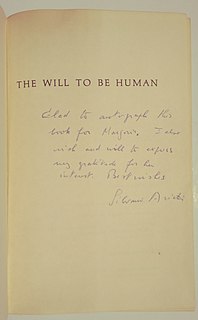A Quote by Steven Sample
Congenital naysayers are among the greatest stumbling blocks to thinking free. Rather than imagining how a new idea might possibly work, they instinctively think of all the reasons why it won't. They sincerely believe that they are doing everyone a favor by reducing the amount of time spent on bad or foolish ideas. But what they really do is undermine the creativity that can be harvested from thinking free.
Quote Topics
Among
Amount
Bad
Believe
Blocks
Creativity
Doing
Everyone
Favor
Foolish
Free
Greatest
How
Idea
Ideas
Imagining
Instinctively
Might
Naysayers
New
New Idea
Possibly
Rather
Really
Reasons
Reducing
Sincerely
Spent
Stumbling
Stumbling Block
Stumbling Blocks
Than
Think
Thinking
Time
Time Spent
Undermine
Why
Work
Related Quotes
It would much conduce to the public benefit, if, instead of discouraging free-thinking, there was erected in the midst of this free country a dianoetic academy, or seminary for free-thinkers, provided with retired chambers, and galleries, and shady walks and groves, where, after seven years spent in silence and meditation, a man might commence a genuine free-thinker, and from that time forward, have license to think what he pleased, and a badge to distinguish him from counterfeits.
As an educator, I try to get people to be fundamentally curious and to question ideas that they might have or that are shared by others. In that state of mind, they have earned a kind of inoculation against the fuzzy thinking of these weird ideas floating around out there. So rather than correct the weird ideas, I would rather them to know how to think in the first place. Then they can correct the weird idea themselves.
The reason why some people love to engage in dangerous activities, such as mountain climbing, car racing, and so on, although they may not be aware of it, is that it forces them into the Now - that intensely alive state that is free of time, free of problems, free of thinking, free of the burden of the personality.
In order to have a hope of creating better answers, we need to deeply understand the logic of the opposing answers. That means thinking about how we think about both models - not just do we like one versus the other. Rather we have to ask: How do I think each model produces the results that it does? Metacognition, thinking about thinking, builds up our capacity to do that and to play with opposing ideas - and new models - in real time.
A conditioned mind may be inventive; it may think up new ideas, new phrases, new gadgets; it may build a dam, plan a new society, and all the rest of it; but that is not creativity. Creativity is something much more than the mere capacity to acquire a technique. It is because this extraordinary thing called creativity is not in most of us that we are so shallow, empty, insufficient. And only the mind that is free can be creative.
How much time have you invested in thinking about strategy? How many options have you considered before the plan was written? How have you ensured that the thinking behind the plan is challenged? How much time do you spend exploring trends, possibilities and cool stuff? How much time is spent playing with ideas, hopes and dreams?
Steve Jobs did not start started Apple as a scam. But he understood early on the power of marketing. The idea of the computer as a bicycle for the human mind - I think that was something he believed. He believed in making people comfortable with these machines, which is why he spent so much time thinking about how to design them a certain way, how to make them so user-friendly and interactive, and why he spent so much time studying the Zeitgeist.
Creativity is not simply originality and unlimited freedom. There is much more to it than that. Creativity also imposes restrictions. While it uses methods other than those of ordinary thinking, it must not be in disagreement with ordinary thinking-or rather, it must be something that, sooner or later, ordinary thinking will understand, accept, and appreciate. Otherwise the result would be bizarre, not creative.
I’m free, I think. I shut my eyes and think hard and deep about how free I am, but I can’t really understand what it means. All I know is I’m totally alone. All alone in an unfamiliar place, like some solitary explorer who’s lost his compass and his map. Is this what it means to be free? I don’t know, and I give up thinking about it.
































